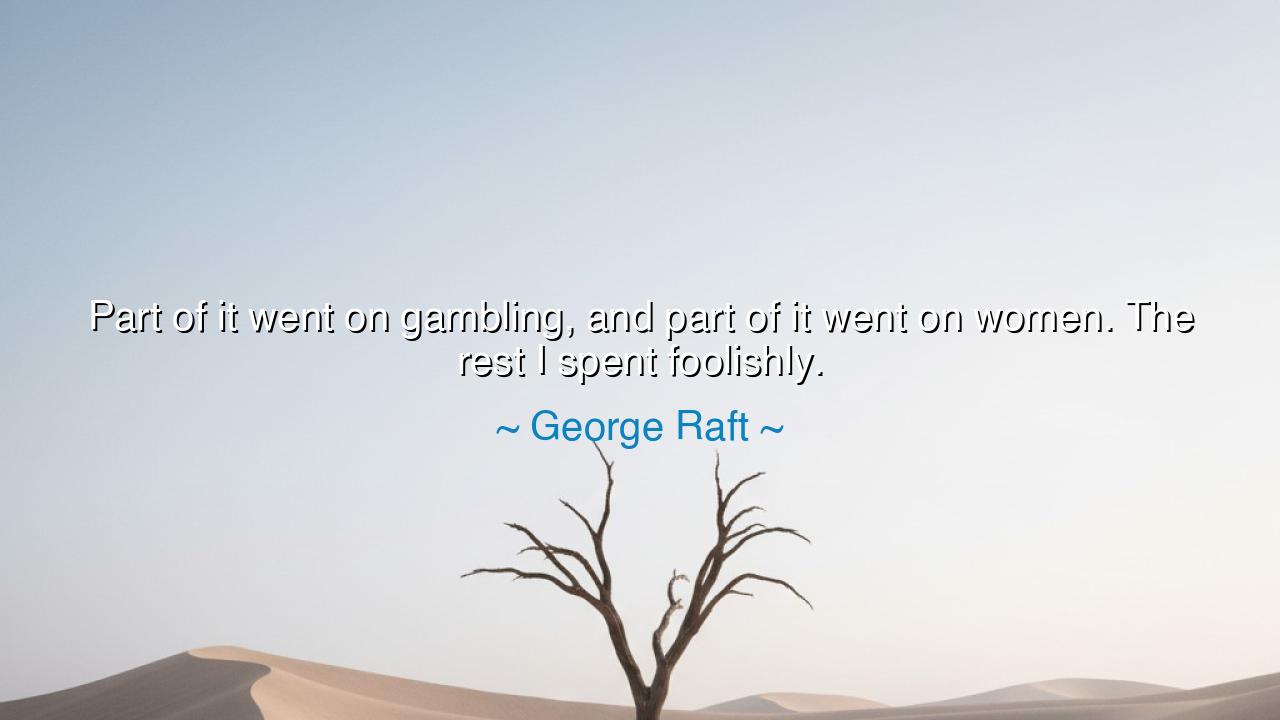
Part of it went on gambling, and part of it went on women. The






Hear the voice of George Raft, actor of Hollywood’s golden age, whose words still echo with irony and wisdom: “Part of it went on gambling, and part of it went on women. The rest I spent foolishly.” At first, these words strike as jest, a playful confession of squandered riches. Yet beneath their humor lies a deeper truth about the fleeting nature of wealth, the temptations of desire, and the folly of human excess.
For gambling has ever been the lure of chance, promising fortune yet delivering ruin to countless souls. To cast one’s gold upon the table is to entrust destiny to dice and cards, and Raft, who himself had lived on the edges of the underworld, knew well both the thrill and the emptiness it left behind. Women, too, are invoked not as partners in love, but as symbols of the indulgence that wealth makes possible, where desire is mistaken for fulfillment. In this way, Raft names the great distractions of life—the fleeting pleasures that devour time and treasure.
Consider the tale of Marcus Licinius Crassus, the wealthiest man of Rome. He squandered fortunes on pursuits of power, spectacle, and fleeting glory. Though he had more than any other Roman, his hunger drove him into reckless war against Parthia, where he met death in disgrace, his greed leaving him ruined in body and in memory. Like Raft’s wry admission, Crassus reminds us that wealth without wisdom turns quickly to folly.
Yet Raft cloaks his confession in humor, making mockery of himself and the vanity of riches. His jest is a shield, but also a teaching: that to squander is a universal weakness, that money can vanish as swiftly as it arrives, and that in the end, all such indulgences are but different faces of foolishness. Laughter softens the sting, but truth remains—wealth is a fragile gift, easily consumed.
Therefore, let this lesson endure: riches may be gathered, but without discipline they scatter like dust in the wind. To spend upon gambling, to lose oneself in passing pleasures, is not only the path of Raft but of countless souls through history. Yet in confessing it, he offers wisdom: better to see the folly of excess than to live blind to its grip. For wealth is not in what is wasted, but in what endures—in virtue, in love, and in the legacy left behind.






MHNguyen Thi My Hoa
Raft’s admission of his spending habits gives us a unique insight into his personality. There’s a bit of humor in the way he categorizes his life choices, but it also raises the question: how often do we reflect on how we spend our time and money? Are we too quick to categorize our own actions as ‘foolish,’ or is there a deeper meaning in understanding what we value and how we invest in those things?
TNTran Nhi
This quote feels like a snapshot of a different time when excess and indulgence seemed to go hand-in-hand with fame and fortune. But Raft’s reflection on his ‘foolish’ spending makes me think: could someone in today’s world be as open about their flaws without facing judgment? Does this quote serve as a cautionary tale about the dangers of living too recklessly, or is it simply an entertaining glimpse into Raft’s character?
NPNguyen Pham
There’s something both charming and troubling about Raft’s quote. The idea that he could recognize his poor decisions in such an unashamed way makes me curious about how people from that era viewed their vices. Was he just reflecting the norms of the time, or was he genuinely at peace with the way he lived? Do we admire his honesty, or is it a reminder of how often we trivialize the consequences of our choices?
MManh
George Raft’s statement is both amusing and a little sad. It makes me wonder: is he simply making light of his past, or is this an expression of regret? It’s interesting how he splits the blame between gambling and women, but what about the other parts of his life? When someone admits to foolish spending, do we see it as a reflection of a deeper personal conflict or just a facet of their character?
NMNguyen Doan Nhat Minh
Raft's openness about how he spent his money is a bit shocking but also relatable to a certain extent. We all go through phases where we make choices we later consider ‘foolish.’ But to be so blunt about it in such a public way shows a level of honesty or perhaps indifference. Is it possible that this quote is his way of embracing his past without regret, or do you think he feels some sorrow over those decisions?